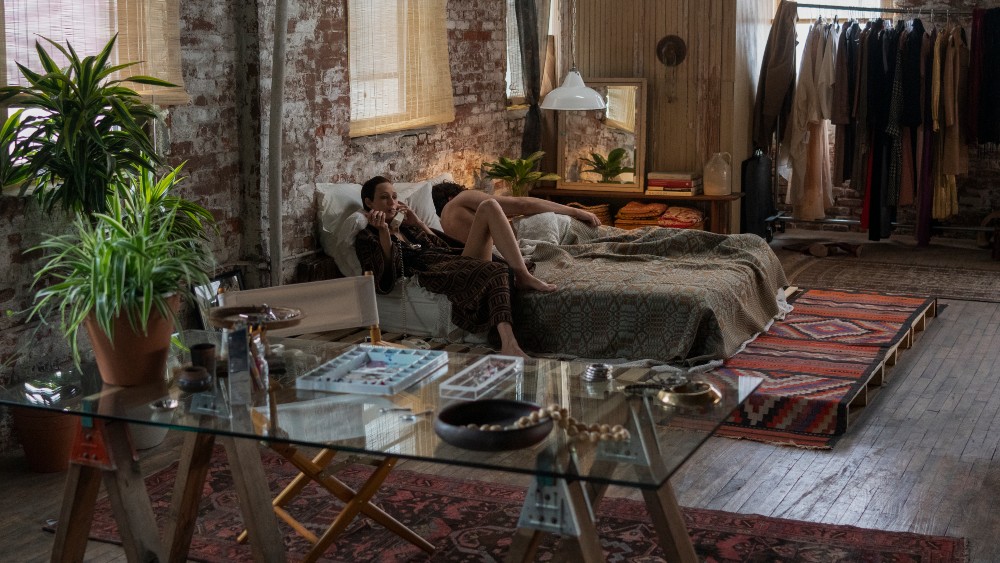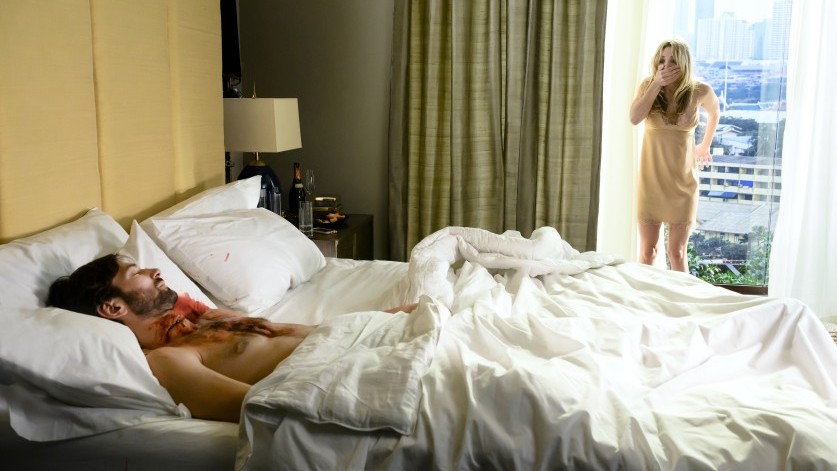
Over the past few years, there have been a lot of conversations about the proper and appropriate behavior one should use while dealing with coworkers and employees. This gets more complicated on set where intimacy between actors and nudity are sometimes part of the storytelling for movies, television, and even the Broadway stage. The role of an Intimacy Coordinator (or Intimacy Director) is not something that was too well known until 2017, when the #MeToo and Time’s Up movements made it obvious that there needed to be someone watching out for the safety and concerns of those involved in such scenes.
It’s also been something important enough to be addressed by SAG-AFTRA, first through releasing a guide in early 2020 called Standards and Protocols for the Use of Intimacy Coordinators. Earlier this month, SAG-AFTRA went one step further by releasing Recommended Standards for Qualifications, Training & Vetting of Intimacy Coordinators, as a commitment to the union’s commitment to build a safer working environment for its members. At the same time, SAG-AFTRA created sagaftrasafeplace.org, a site where incidents of sexual harassment could be reported anonymously, including by bystanders who have witnessed such harassment.
Marcus Watson is one such certified Intimacy Coordinator with over a decade of experience in New York City, having started out as a fight coordinator and movement specialist, who then apprenticed under Alicia Rodis. He has now been working as an intimacy coordinator for studios like Hulu, Netflix, STARZ, the CW, and HBO Max. He has also taught intimacy and consent workshops for theater and dance companies.
Below the Line got on the phone with Watson a few months back for the following discussion about how his role as an Intimacy Coordinator is being implemented. We were hoping to talk to him about a couple of recent movies that involve violent sex scenes, particularly Pieces of a Woman and The United States vs. Billie Holiday, but he hadn’t seen them yet. On the other hand, we did get a chance to ask Watson about a very specific Saturday Night Live sketch that partially spoofed Netflix’s Bridgerton but also featured two very inappropriate intimacy coordinators.

Below the Line: You have a background in dance and fight coordinating, so let’s start with how you got into that. Was that the main focus of what you were doing when you came to New York?
Marcus Watson: My main focus was acting. I started doing stage combat in a summer Shakespeare program when I was in fifth grade, so I started working with different fight instructors every summer, and then really liked acting and doing Shakespeare. So then I came to New York City. I had always been very athletic, and I was doing gymnastics, and was in dance classes here in the city and continued working on stage combat and violence. Just being here in the city, working in theater, I started to hone my craft in stage combat, and work at starting to choreograph and actually coordinate for stage productions and a few independent films, here and there, and then kept working on physical storytelling. I kept working on dance and gymnastics. I hooked up with a mime teacher, Richmond Shepard, and did a lot of mime work as well. So just kind of really anything I could do with physical storytelling I really gravitated towards.
Then I was working with Alicia Rodis at a university — I was assisting her with an unarmed class for a college course. That was right about the time that she, with two others, started Intimacy Directors International (IDI), and I kind of took any workshop I could with Alicia, and then they offered some bigger opportunities for training, so I went and did a nine-day course, and just continued working in honing my craft and intimacy coordination and choreography.
In many ways, as a fight coordinator, I was brought in for violence and fight, and sometimes that was a sexual violence situation where you’re doing Spring Awakening or something, and there is a scene of sexual violence. So I’m approaching it like a fight coordinator or a fight director, where we’re learning what the boundaries are, what are the safeties? What are the moves that will keep everyone safe? I approached every part of that in the same way. So whether it was a kiss, a touch, a grab to the throat, anything like that, we talked about the actors’ boundaries, what they were comfortable with, and kind of what the safeties are to keep both parties safe.
Many times, directors would be like, “Well, that was really interesting how you handled that kiss or how you dealt with that moment. There’s actually another moment later on in the play. It doesn’t really have any violence or anything, but would you mind looking at it?” It usually ended up being a kiss or something of that nature. So there were moments before even working with Alicia and Intimacy Directors International that I was finding myself doing this and not really having the training or having a name for it. That’s something that Tonia Sina, who wrote her dissertation on intimacy choreography and everything back in the early 2000s. She kind of put a name to Intimacy Direction, and then started trying to find people to help her create a company to make this a farther-reaching craft, and that’s kind of how I got in with it and working with Alicia.
I think Intimacy Directors International started around 2015, so she started that with Siobhan Richardson and Tonia Sina, and then in 2015, they started doing workshops and really trying to flesh out this system. And then the #MeToo movement came into play, which was kind of a springboard for this movement in that there are many people who were consistently and constantly telling their stories in this profession of harm that had been done, but no one was really listening to them. The #MeToo movement kind of forced people to take notice and to listen to the victims and the people who were bringing this up. That really helped to launch intimacy coordinators and intimacy directors, especially in film and TV, which was really exciting to be a part of something that was new and so important.

BTL: I think the first time I ever heard about this role was in 2017 when the #MeToo movement was happening, and we were made aware that many actors weren’t happy with what they were being pressured into doing stuff on set they weren’t comfortable with for their craft and their art. It was the first time I heard about an Intimacy Coordinator or Intimacy Director. By the way, is there any difference between those two terms?
Watson: You have to be careful, especially in film. There’s a certain weight behind anything with the title “director,” so we act more as a coordinator role for film, but that’s why we are called “intimacy coordinators” in film and TV, and then intimacy directors for theater.
BTL: I’m glad you explained how you got into that, because I wasn’t sure how fight coordinating could lead to intimacy coordinating, which seemed like an odd transition to me. But it makes a lot more sense as you explained it.
Watson: I think there’s also a desire to tell physical stories. It was something I always gravitated towards was physical storytelling, miming, being able to tell a very specific story. Then so many times in scripts that either says “they fight,” or “they kiss,” or “they have sex,” and it’s kind of left up to interpretation or left up to collaboration for what that means. I feel like there are many of us who are in this profession now who come from choreography and movement teaching backgrounds, so we’re able to look at a body and say, “Okay, great, so this isn’t telling the story, because the hips aren’t in the right place. And we need to isolate the chest a little bit more,” or because “this arm is telling a false story, and it looks awkward, and it’s pulling away from the focus that you want in this moment.” So we’re able to look at the body and know how it moves in space, and how to adjust and correct those little nuances and movements, so that we’re telling a very specific story and the story that the production wants to tell, as opposed to just saying, “Oh, just do something, and let’s hope that these two actors who don’t have a third person looking and are drawing only from personal experience are creating, as opposed to having someone who is coming in with an understanding of movement, understanding of the story to then look and say, “Great. I understand your intention, but the impact is not coming across, so let’s coordinate that and let’s choreograph it.”
BTL: It definitely sounds like your role is as much about the choreography as it is a psychological role, but there has to be some of that involved as well, knowing the actors’ boundaries and talking to them about it. When are you usually brought in on a project? Let’s say there’s something taking place on an episode of a television show, so are you brought in before they start filming or hit set or usually just the day of shooting?
Watson: Beforehand is always preferable just because there is a lot of choreography and things of that nature, if that’s what the production needs. Some directors and actors are very comfortable with the choreography and know exactly what they’re wanting. So then it’s my job to come more for gauging consent outside of the power dynamics that exists on set and making sure that we’re getting consent that’s freely given. You can only freely give consent as long as there’s a state where they can say “no.”

So that’s why we take out those power dynamics. We take that conversation away from the producers and the directors who have the hiring and firing power, who have lots of power in the room. I come in and I gauge consent outside of that power dynamic. So that happens beforehand. I talk with the actors, and I liaison between production and talent, so that talent is aware of what production is wanting, and production is aware of what talent is consenting to and agreeing to.
That’s all done beforehand, and the more communication and conversation and fleshing out of the scene that we can do before, then the same day of, it’s so much smoother, because these are heightened circumstances. These are people who many times are simulating a sexual act or are nude and simulating a sexual act. So we are in a very heightened place, in a very vulnerable place, so we want to make sure that all those questions, everything that can be discussed beforehand, is done in a safe space. So that then we’ve created a nice safe place where they can do the dangerous work, as opposed to stepping in and not knowing what’s going on and you don’t feel like you’re being taken care of, and you feel like it’s a little bit of a dangerous space, and you can only make those safe decisions in those safe choices.
So there is a lot of work that goes in ahead of time. And then once I’m on set, I’m there to watch monitor, make sure that everything we’ve talked about, everything we’ve discussed is what’s happening, is what’s being shown on monitor, as well as making sure that we’re sticking to the nudity and simulated sex riders that have been signed. Yes, there’s a lot of choreography, but then there’s a lot of advocacy and consent work and understanding power dynamics on set, and how to kind of navigate all of those situations on the day of.
BTL: I’ve found that most directors and producers are very conscious of when actors are doing nudity and to have the smallest crew they need and only people on set who need to be there. Do you have the power to kick people off set if you feel they don’t need to be there or is that something you need to talk to the director or first AD and have them do it?
Watson: I work especially with the first AD a lot with closing down the set. The first day, they and I talk about what the protocols are, who’s going to be at monitor, who’s allowed at monitor, making sure that we only have the essential crew there. Many times I’m on set, just for one scene, so I don’t know everyone. I don’t know all the people who are there, always, especially if it’s a long season, and they’re just bringing in one person for this one scene in this one episode. So I have conversations with the first AD, and then if something is happening or there are people who I’m not sure are supposed to be there, I talk with the AD, and we make sure that only the essential personnel are there just for the comfortability of the actors.
For the most part, producers and directors are fantastic and are really great and understand their power and the power dynamic on set. It’s just many times, they are doing so much in a production, that certain specifics are left out or glossed over. “Well, of course, we’re gonna be doing that. Everyone understands that,” but it hasn’t been relayed to the actor, specifically. Or there’s just things that kind of fall by the wayside sometimes. Having someone come in, to solely focus on that moment of intimacy and make sure that everything is communicated and that all the T’s are crossed and the i’s are dotted, so that when we get to set, there’s no surprises. There’s no huge questions lingering. We know what we’re doing, we know what we’re expecting, and we can get in there and do it quickly.
BTL: I know that the networks especially have been very active in making sure they have intimacy coordinators on hand. Are you ever involved as a consultant in the script stage when they’ve written a script for a television show or movie that involves such scenes, or is it always closer to production?
Watson: It’s usually closer to production. In some cases, I’ve been brought in for things to say, “Great, so this is what we’re looking at doing. These are the scenes we’re looking at. Does this all look like it is what it needs to be? Would we need an intimacy coordinator on this or not?” I’m thinking of one where I was brought on really early before casting because it was dealing with minors. A lot of it was, “Great, so let’s talk about the legalities, and let’s talk about everything you need to ask your lawyers, because these are questions that you need to think about.” So sometimes I am brought on really early to kind of look at and consult, but mostly, it’s when the production has already decided that they need an intimacy coordinator, and they’re bringing me in to say, “This is what we have written, and we think it deems the need or the necessity for an intimacy coordinator,” and then I’m brought in.
BTL: So we have to talk about that SNL sketch from a few months back that basically poked fun at two inappropriate intimacy coordinators on Bridgerton. After you saw it, did you feel you had to set the record straight on what you do for a living?
Watson: Part of it is that you feel like you’ve made it if your position is being spoofed on SNL. Great, at least people are aware of this position, which is amazing, considering the short amount of time that we have been working. It’s interesting, because I think it’s hit me a little bit differently than some of my colleagues, being a male intimacy coordinator. Because I do worry about coming on the set, being a male intimacy coordinator. I feel like I do have to take steps to make sure that I am approachable, and that I am there as an advocate, and that all actors, female and male, or any gender, understand what my position is, and I’m there as an advocate to help. It did strike a little bit of a “UGH” kind of tone, because it’s these two guys, who are obviously tone-deaf to the situation, and are just not acting in the best interest of the actors, but there’s also the moments at the very beginning where the actors are like, “Oh, yeah, we’ve worked with intimacy coordinators, that’s really great.” So there’s that moment of acknowledgment of, “We have worked with intimacy coordinators. We like to position, and the position is respected.” And then you have these guys who come in and make a total mess of it, and goof it all up, and then they’re like, “Okay, this is really messed up. You’re not doing what you’re supposed to do.” And then they come in with makeup and hair, so then it’s like, “Okay, this production is just a mess.” There was a little bit of like, “Okay, it’s just very tongue in cheek,” but there was a little bit of that hit a chord that was like, “I am a male coordinator that’s having to come into these spaces and make sure that I am not causing further harm.” And I felt that once.
BTL: Do you have any actors who have put you on a retainer or have asked you to be involved when they have to do intimacy on a project because they know you and trust you from previous work? It seems like that would eventually be where things are going.
Watson: I’ve worked on productions where the actors have asked for AN intimacy coordinator, not me by name. And then I have worked on productions where I have gotten the job because the first AD has worked on a previous show with me and is now doing a new production. That’s how I came onto that new production was because the first AD was like, “I worked with Marcus, he was really great. Let’s bring him on to do this thing as well.” So I don’t know if there are actors who have asked for me specifically, but I do know that people who I have worked with in the past have brought me on, and then also, we’re such a small community right now, all of us intimacy coordinators are kind of helping each other out. When one of us is not available, we’re saying, “We have this other person,” or “Here’s a colleague of mine that you should reach out to.” We’re definitely helping each other in those areas.
BTL: It sounds like you have a great network, and I feel that with actors, they have their own stylists and make-up, and I feel like something as personal as this would be someone they want to have around, so hopefully that’s something that will happen eventually, as it becomes more common.
Watson: I think the longer that this position is going, I think that probably will happen, just because you’ve created a rapport with someone, and you feel comfortable discussing and talking about these very intimate things with them that you would want to bring that same person back in, if possible.
BTL: I have to ask about COVID, because that’s obviously been something that’s been so prevalent and predominant in production. It just adds a whole new level of complexities and complications in terms of adding more time and money to everything. But especially with your job, which involves actors being in close contact with each other. I know that some productions have hired husband-wife actors when they can, but how has that affected your job and what you do? What are some of the concerns you have when dealing with things like that?
Watson: It definitely makes you relook at anything where you’re dealing with mucous membranes, so eyes, mouth, nose, just because of the way that everything is transferred. Before, if there were kisses on set, or there were things… unless it was like a heavy makeout or something, the production and the actors felt comfortable doing that with each other. I’ve noticed in the few productions I’ve done since COVID, that the production is more willing to bring me on for those scenes that are just even as simple as a kiss, because of the heightened circumstances around it. These are two actors who are engaging in a thing that could possibly spread a virus. There have been more safeties, and of course, all of the testing and all of the things that go into creating a TV show or something during this time.
And then you have the added precautions of, “Great, now what do we do for this kissing scene? Or in this simulated sex scene? Do they need to kiss? Can we do something else? How else can we choreograph this so that we are enabling them to have a little bit more distance and a little bit less contact with each other?” It has, I think, allowed production to say, “So what are some other options that we have?” Whereas maybe before it was like, “Nope, this is what it is, because this is what I want, and let’s try to figure out how this works.” It’s more like, “Okay, great, so what are the other options?”
Which I love, because I don’t think there’s just one way to tell a story. I feel like there’s so many ways to tell a story, which is so great and why I encourage actors to tell me exactly what their boundaries are, and tell me “no,” because “no” is a conversation. “No, I don’t want to do that, but here’s things I can do.” Great. Now we’re communicating, we’re collaborating. We’re building something together that you’re going to be confident in, and now we can create a story that really sells, because everyone is comfortable.
BTL: It feels like you have a very complex role. Oftentimes, there’s a lot of egos on set, and you have to be sensitive to everyone. There’s a lot of considerations to deal with, almost like in real life, when you go on a date and you’re not sure if and when to kiss someone or to kiss them back. That’s just a whole thing in itself, so it must be more complicated when you’re an actor and pretending that stuff as part of your job. It seems like it can get really complicated.
Watson: There’s a lot of stuff that you’re balancing and weighing in the moment and figuring out how to handle in the moment, which is difficult. Every set has its own vibe and atmosphere, and every director works in a slightly different way. And there’s lots of different personalities, and techniques and different things, and we’re working one-on-one with these directors and actors. So you have to pick up very quickly on how this set is working, how this director works, and how the actors work, and try to balance that.
You can learn more about Marcus Watson (and/or hire him!) at Intimacy Directors & Coordinators’ website, IDCProfessionals.com.





